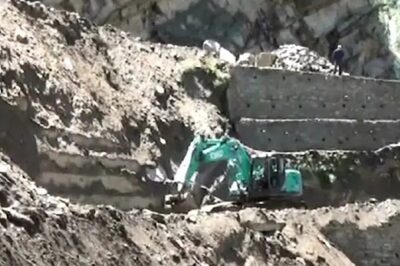
views
Tripoli: Dozens of Libyan religious leaders on Monday urged authorities to disarm former rebels and form a national army, backing the transitional government's struggle to exert control over the militias that overthrew dictator Muammar Gaddafi.
The fighters are widely admired for their role in bringing down the Gaddafi regime, but the clerics' statement reflected concern over the militias' refusal to submit to the central authority. Dozens of militias have held on to arsenals of heavy weapons and sometimes clash among themselves.
"We advise speeding up the process of establishing a national army and the collection of arms," said a statement from the 250 imams and other clerics gathered for a conference in Tripoli, the first of its kind after the fall of the Gaddafi regime. It was organized by Libya's Ministry of Islamic Affairs.
The clerics expressed fears that tribal and regional tensions could lead to a deterioration of security. "We need to focus especially on reconciliation and ... on building the new state of Libya," said Salim Jabar, an imam from the eastern city of Benghazi.
Participants complained about young men who they said carried weapons on the street and fired into the air for fun, sometimes killing people.
Libya's ruling National Transitional Council says it is working on forging a national army, integrating some of the militias and disarming the rest. Officials acknowledge that process could take months, and they said they could not force the militias to go along.
In a report that highlighted one of the consequences of lack of militia accountability, the UN said that former Libyan revolutionaries still hold about 7,000 prisoners from the civil war, some of whom were subjected to torture and ill treatment.
The report by UN Secretary-General Ban Ki-moon, made public before a Security Council briefing, said that many of the inmates have no access to due process in the absence of a functioning police and judiciary.
The 250 clerics also demanded that the country's planned constitution be based on Islamic Shariah law, and that anything that violates Islam - including the consumption of alcohol - remain illegal. Alcohol consumption was banned by Gaddafi, a policy that found favor with many Libyans.
Most political forces in this conservative and overwhelmingly Sunni Muslim country expect that religion will guide the future shape of the state, although it is still unclear how the precepts of Islamic law will be implemented.
The clerics also said they were concerned with what they said were "rumors" circulating in Libya's newly freed press. One advocated a law that would allow journalists to be charged with murder for publishing false information that incites tribal or other tensions.
After the conference, female reporters who tried to interview a leading cleric were told they could not do so, because he did not speak to women.
Also Monday, NTC leader Mustafa Abdul-Jalil said a key official has been arrested on suspicion of involvement in the July assassination of a senior rebel commander.
The transitional government's former deputy prime minister and top diplomat, Ali al-Essawi, was arrested along with others during the investigation of the killing of Gen. Abdel-Fatah Younis, Abdul-Jalil said in a televised news conference. He did not say when they were arrested, how many or who they were.
Younis was a former interior minister in Gaddafi's regime who defected to the rebel side in February and helped command the uprising. Some rebels distrusted him and believed he was working secretly for Gaddafi.
Abdul-Jalil said a military prosecutor had evidence that Younis "was not a traitor."




















Comments
0 comment